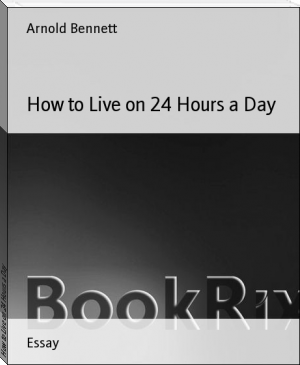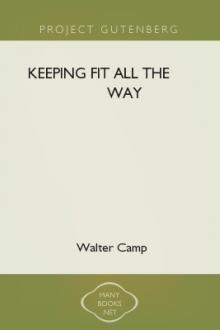The Author's Craft by Arnold Bennett (good summer reads TXT) 📖

- Author: Arnold Bennett
Book online «The Author's Craft by Arnold Bennett (good summer reads TXT) 📖». Author Arnold Bennett
The one other important rule in construction is that the plot should be kept throughout within the same convention. All plots--even those of our most sacred naturalistic contemporaries--are and must be a conventionalisation of life. We imagine we have arrived at a convention which is nearer to the truth of life than that of our forerunners. Perhaps we have--but so little nearer that the difference is scarcely appreciable! An aviator at midday may be nearer the sun than the motorist, but regarded as a portion of the entire journey to the sun, the aviator's progress upward can safely be ignored. No novelist has yet, or ever will, come within a hundred million miles of life itself. It is impossible for us to see how far we still are from life. The defects of a new convention disclose themselves late in its career. The notion that "naturalists" have at last lighted on a final formula which ensures truth to life is ridiculous. "Naturalist" is merely an epithet expressing self-satisfaction.
Similarly, the habit of deriding as "conventional" plots constructed in an earlier convention, is ridiculous. Under this head Dickens in particular has been assaulted; I have assaulted him myself. But within their convention, the plots of Dickens are excellent, and show little trace of amateurishness, and every sign of skilled accomplishment. And Dickens did not blunder out of one convention into another, as certain of ourselves undeniably do. Thomas Hardy, too, has been arraigned for the conventionalism of his plots. And yet Hardy happens to be one of the rare novelists who have evolved a new convention to suit their idiosyncrasy. Hardy's idiosyncrasy is a deep conviction of the whimsicality of the divine power, and again and again he has expressed this with a virtuosity of skill which ought to have put humility into the hearts of naturalists, but which has not done so. The plot of _The Woodlanders_ is one of the most exquisite examples of subtle symbolic illustration of an idea that a writer of fiction ever achieved; it makes the symbolism of Ibsen seem crude. You may say that _The Woodlanders_ could not have occurred in real life. No novel could have occurred in real life. The balance of probabilities is incalculably against any novel whatsoever; and rightly so. A convention is essential, and the duty of a novelist is to be true within his chosen convention, and not further. Most novelists still fail in this duty. Is there any reason, indeed, why we should be so vastly cleverer than our fathers? I do not think we are.
V
Leaving the seductive minor question of ornamentation, I come lastly to the question of getting the semblance of life on to the page before the eyes of the reader--the daily and hourly texture of existence. The novelist has selected his subject; he has drenched himself in his subject. He has laid down the main features of the design. The living embryo is there, and waits to be developed into full organic structure. Whence and how does the novelist obtain the vital tissue which must be his material? The answer is that he digs it out of himself. First-class fiction is, and must be, in the final resort autobiographical. What else should it be? The novelist may take notes of phenomena likely to be of use to him. And he may acquire the skill to invent very apposite illustrative incident. But he cannot invent psychology. Upon occasion some human being may entrust him with confidences extremely precious for his craft. But such windfalls are so rare as to be negligible. From outward symptoms he can guess something of the psychology of others. He can use a real person as the unrecognisable but helpful basis for each of his characters.... And all that is nothing. And all special research is nothing. When the real intimate work of creation has to be done--and it has to be done on every page--the novelist can only look within for effective aid. Almost solely by arranging and modifying what he has felt and seen, and scarcely at all by inventing, can he accomplish his end. An inquiry into the career of any first-class novelist invariably reveals that his novels are full of autobiography. But, as a fact, every good novel contains far more autobiography than any inquiry could reveal. Episodes, moods, characters of autobiography can be detected and traced to their origin by critical acumen, but the intimate autobiography that runs through each page, vitalising it, may not be detected. In dealing with each character in each episode the novelist must for a thousand convincing details interrogate that part of his own individuality which corresponds to the particular character. The foundation of his equipment is universal sympathy. And the result of this (or the cause--I don't know which) is that in his own individuality there is something of everybody. If he is a born novelist he is safe in asking himself, when in doubt as to the behaviour of a given personage at a given point: "Now, what should _I_ have done?" And incorporating the answer! And this in practice is what he does. Good fiction is autobiography dressed in the colours of all mankind.
The necessarily autobiographical nature of fiction accounts for the creative repetition to which all novelists--including the most powerful--are reduced. They monotonously yield again and again to the strongest predilections of their own individuality. Again and again they think they are creating, by observation, a quite new character--and lo! when finished it is an old one--autobiographical psychology has triumphed! A novelist may achieve a reputation with only a single type, created and re-created in varying forms. And the very greatest do not contrive to create more than half a score genuine separate types. In Cerfberr and Christophe's biographical dictionary of the characters of Balzac, a tall volume of six hundred pages, there are some two thousand entries of different individuals, but probably fewer than a dozen genuine distinctive types. No creative artist ever repeated himself more brazenly or more successfully than Balzac. His miser, his vicious delightful actress, his vicious delightful duchess, his young man-about-town, his virtuous young man, his heroic weeping virgin, his angelic wife and mother, his poor relation, and his faithful stupid servant--each is continually popping up with a new name in the Human Comedy. A similar phenomenon, as Frank Harris has proved, is to be observed in Shakspere. Hamlet of Denmark was only the last and greatest of a series of Shaksperean Hamlets.
It may be asked, finally: What of the actual process of handling the raw material dug out of existence and of the artist's self--the process of transmuting life into art? There is no process. That is to say, there is no conscious process. The convention chosen by an artist is his illusion of the truth. Consciously, the artist only omits, selects, arranges. But let him beware of being false to his illusion, for then the process becomes conscious, and bad. This is sentimentality, which is the seed of death in his work. Every artist is tempted to sentimentalise, or to be cynical--practically the same thing. And when he falls to the temptation, the reader whispers in his heart, be it only for one instant: "That is not true to life." And in turn the reader's illusion of reality is impaired. Readers are divided into two classes--the enemies and the friends of the artist. The former, a legion, admire for a fortnight or a year. They hate an uncompromising struggle for the truth. They positively like the artist to fall to temptation. If he falls, they exclaim, "How sweet!" The latter are capable of savouring the fine unpleasantness of the struggle for truth. And when they whisper in their hearts: "That is not true to life," they are ashamed for the artist. They are few, very few; but a vigorous clan. It is they who confer immortality.
PART III
WRITING PLAYS
I
There is an idea abroad, assiduously fostered as a rule by critics who happen to have written neither novels nor plays, that it is more difficult to write a play than a novel. I do not think so. I have written or collaborated in about twenty novels and about twenty plays, and I am convinced that it is easier to write a play than a novel. Personally, I would sooner _write_ two plays than one novel; less expenditure of nervous force and mere brains would be required for two plays than for one novel. (I emphasise the word "write," because if the whole weariness between the first conception and the first performance of a play is compared with the whole weariness between the first conception and the first publication of a novel, then the play has it. I would sooner get seventy-and-seven novels produced than one play. But my immediate object is to compare only writing with writing.) It seems to me that the sole persons entitled to judge of the comparative difficulty of writing plays and writing novels are those authors who have succeeded or failed equally well in both departments. And in this limited band I imagine that the differences of opinion on the point could not be marked. I would like to note in passing, for the support of my proposition, that whereas established novelists not infrequently venture into the theatre with audacity, established dramatists are very cautious indeed about quitting the theatre. An established dramatist usually takes good care to write plays and naught else; he will not affront the risks of coming out into the open; and therein his instinct is quite properly that of self-preservation. Of many established dramatists all over the world it may be affirmed that if they were so indiscreet as to publish a novel, the result would be a great shattering and a great awakening.
II
An enormous amount of vague reverential nonsense is talked about the technique of the stage, the assumption being that in difficulty it far surpasses any other literary technique, and that until it is acquired a respectable play cannot be written. One hears also that it can only be acquired behind the scenes. A famous actor-manager once kindly gave me the benefit of his experience, and what he said was that a dramatist who wished to learn his business must live behind the scenes--and study the works of Dion Boucicault! The truth is that no technique is so crude and so simple as the technique of the stage, and that the proper place to learn it is not behind the scenes but in the pit. Managers, being the most conservative people on earth, except compositors, will honestly try to convince the naive dramatist that effects can only be obtained in the precise way in which effects have always been obtained, and that this and that rule must not be broken on pain of outraging the public.
And indeed it is natural that managers should talk thus, seeing the low state of the drama, because in any art rules and reaction always flourish when creative energy is sick. The mandarins have ever said and will ever say that a technique which does not correspond with their own is no technique, but simple clumsiness. There are some seven situations in the customary drama, and a play which does not contain at least one of those situations in each act





Comments (0)